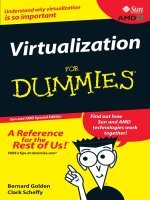Wiley wikipatterns dec 2007 ISBN 0470223626 pdf
Bạn đang xem bản rút gọn của tài liệu. Xem và tải ngay bản đầy đủ của tài liệu tại đây (3.13 MB, 208 trang )
Wikipatterns
Stewart Mader
Wiley Publishing, Inc.
Wikipatterns
Wikipatterns
Stewart Mader
Wiley Publishing, Inc.
Wikipatterns
Published by
Wiley Publishing, Inc.
10475 Crosspoint Boulevard
Indianapolis, IN 46256
www.wiley.com
Copyright 2008 by Wiley Publishing, Inc., Indianapolis, Indiana
Published simultaneously in Canada
ISBN: 978-0-470-22362-8
Manufactured in the United States of America
10 9 8 7 6 5 4 3 2 1
No part of this publication may be reproduced, stored in a retrieval system or transmitted
in any form or by any means, electronic, mechanical, photocopying, recording, scanning or
otherwise, except as permitted under Sections 107 or 108 of the 1976 United States Copyright
Act, without either the prior written permission of the Publisher, or authorization through
payment of the appropriate per-copy fee to the Copyright Clearance Center, 222 Rosewood
Drive, Danvers, MA 01923, (978) 750-8400, fax (978) 646-8600. Requests to the Publisher
for permission should be addressed to the Legal Department, Wiley Publishing, Inc., 10475
Crosspoint Blvd., Indianapolis, IN 46256, (317) 572-3447, fax (317) 572-4355, or online at
/>Limit of Liability/Disclaimer of Warranty: The publisher and the author make no representations or warranties with respect to the accuracy or completeness of the contents of
this work and specifically disclaim all warranties, including without limitation warranties
of fitness for a particular purpose. No warranty may be created or extended by sales or
promotional materials. The advice and strategies contained herein may not be suitable for
every situation. This work is sold with the understanding that the publisher is not engaged
in rendering legal, accounting, or other professional services. If professional assistance is
required, the services of a competent professional person should be sought. Neither the
publisher nor the author shall be liable for damages arising herefrom. The fact that an
organization or Website is referred to in this work as a citation and/or a potential source of
further information does not mean that the author or the publisher endorses the information the organization or Website may provide or recommendations it may make. Further,
readers should be aware that Internet Websites listed in this work may have changed or
disappeared between when this work was written and when it is read.
For general information on our other products and services or to obtain technical support,
please contact our Customer Care Department within the U.S. at (800) 762-2974, outside the
U.S. at (317) 572-3993 or fax (317) 572-4002.
Library of Congress Cataloging-in-Publication Data is available from the publisher.
Trademarks: Wiley and the Wiley logo are registered trademarks of John Wiley & Sons, Inc.
and/or its affiliates, in the United States and other countries, and may not be used without
written permission. All other trademarks are the property of their respective owners. Wiley
Publishing, Inc., is not associated with any product or vendor mentioned in this book.
Wiley also publishes its books in a variety of electronic formats. Some content that appears
in print may not be available in electronic books.
To Amy
It is not the strongest of the species that survives, nor the most intelligent, but
those most adaptive to change.
Charles Darwin
About the Author
Stewart Mader is Wiki Evangelist for Atlassian Software Systems, and a
noted wiki/social software researcher, author, blogger, and speaker. Before
joining Atlassian, he worked with several universities and a number of
other organizations to introduce wikis and grow wiki collaboration across
departments, teams, and projects.
In 2007 he launched Wikipatterns.com, a community-built, wiki-based
resource for people to share patterns and strategies for increasing wiki
collaboration.
ix
x
About the Author
He also publishes Blog on Wiki Patterns (ikiw.org), which is his personal
perspective on the uses and benefits of wiki collaboration.
In October 2006, he published Using Wiki in Education (wikiineducation.com),
a book containing 10 wide-ranging case studies from teachers using the wiki
to transform teaching and engage today’s students. This is the first book to
focus specifically on the wiki in education and be developed and published
using a wiki, so it actively demonstrates the tool in action.
About the Author
He has taught science both in the classroom and online, worked extensively
with social software and wiki technology in education, and has worked with
faculty to apply and assess its impact on student learning. He previously
served as Senior Instructional Technologist for Life Sciences and Brown
Medical School at Brown University, Educational Technologist at Emerson
College, Instructional Designer and Interim Director of the Faculty Center for
Learning Development at University of Hartford, and has collaborated with
faculty at Long Island University on a series of teaching and learning projects.
xi
xii
About the Author
He is cofounder of The Science of Spectroscopy (scienceofspectroscopy.info),
a project that rethinks how spectroscopy is taught by using a model that starts
with real-world applications, gets students engaged and asking ‘‘how does it
work?’’ and then teaches techniques and theory. The website is wiki-based,
making it easy for users to quickly edit pages and contribute information using
just a web browser. The project has been featured in the journals Science and
Chemistry International, is a member of the National Science Digital Library
and the National Grid for Learning, and was recently named a member of 33
wikis, a showcase of the best in wiki-based collaboration.
He has produced two films in collaboration with NASA. Seeing the Scientific Light and Skysight let students hear directly from scientists who use
spectroscopy in their everyday work. The films have aired on PBS stations
and are currently in retail distribution. He holds a B.S. in Chemistry from
University of Hartford, and is pursuing an M.S. in Curriculum Development
and Instructional Technology from University at Albany.
Credits
Executive Editor
Chris Webb
Development Editor
Adaobi Obi Tulton
Production Editor
Dassi Zeidel
Copy Editor
Mildred Sanchez
Editorial Manager
Mary Beth Wakefield
Production Manager
Tim Tate
Vice President and Executive
Group Publisher
Richard Swadley
Vice President and Executive
Publisher
Joseph B. Wikert
Project Coordinator, Cover
Lynsey Osborn
Proofreader
Jen Larsen, Word One
Indexer
Robert Swanson
Anniversary Logo Design
Richard Pacifico
Cover Image
iStockphoto.com/Arthur
Kwiatkowski
xiii
Contents at a Glance
Chapter 1
Chapter 2
Chapter 3
Chapter 4
Chapter 5
Chapter 6
Chapter 7
Appendix
Grassroots is Best
1
Case Study: LeapFrog
17
Your Wiki Isn’t (Necessarily) Wikipedia
25
Case Study: Johns Hopkins University
37
What’s Five Minutes Really Worth?
41
Case Study: Sun Microsystems
61
11 Steps to a Successful Wiki Pilot
63
Case Study: Red Ant
75
Case Study: A Conversation with a WikiChampion:
Jude Higdon
81
Drive Large-Scale Adoption
87
Case Study: JavaPolis
101
Case Study: A Conversation with a WikiChampion:
Jeff Calado
103
Prevent (or Minimize) Obstacles
107
Case Study: Kerrydale Street
117
Inspirational
Bull∗∗∗∗
121
Case Study: Constitution Day
127
Case Study: Peter Higgs: Using a Wiki in Research
129
Questions & Answers
141
Index
155
Contents
Foreword
xxv
Acknowledgments
Introduction
Chapter 1
Chapter 2
xxix
xxxiii
Grassroots is Best
Wiki?
The Wikipedia Factor
You Can Do It!
Unleash the Early Adopters
Move Swiftly and with Purpose, but Don’t Rush It
It Doesn’t Matter Where You Are
Listen
Be Open Minded
Become Better at What You Do
Wiki Patterns and Wikipatterns.com
References
1
3
5
6
6
7
7
8
8
9
9
15
Case Study: LeapFrog
1. Why did you choose a wiki?
2. What type of wiki are you using?
3. How are you using the wiki?
4. Looking at Wikipatterns.com, what patterns are in use on
your wiki?
5. What changes have you seen as a result of using a wiki?
17
17
19
19
Your Wiki Isn’t (Necessarily) Wikipedia
Brief History of Wikipedia
Nature Compares Accuracy of Wikipedia and Britannica
25
26
27
22
22
xvii
xviii Contents
The All-Virtual Wiki Community versus Wiki that Mirrors
Physical Community
Why Mischief Doesn’t Happen in an Organization’s Wiki
Open versus Secure
Quality, Accuracy, and Moderators
How Will Your Wiki Be Used?
Build a Peer Directory
Agendas > Meetings > Projects
Manage Projects
Product Development
Knowledge Base or Support Site
Event Planning
Intranet or Extranet
Blogging
External Communication
Public Website
And Many More!
References
Chapter 3
28
29
29
30
30
30
31
31
32
32
33
33
34
34
35
35
35
Case Study: Johns Hopkins University
1. Why did you choose a wiki?
2. What type of wiki are you using?
3. How are you using the wiki?
4. Looking at Wikipatterns.com, what patterns are in use on
your wiki?
5. What changes have you seen as a result of using
a wiki?
37
37
38
38
What’s Five Minutes Really Worth?
What Happened to Knowledge Management?
Something Wiki This Way Comes
What Makes a Wiki a Wiki?
Basic Structure
The Enterprise Wiki: Spaces and Pages
Editing Pages and Creating Content
Folksonomy
Recent Changes
Balancing Trust and Control: Why Wikis Have Succeeded
Where Others Have Failed
How Atlassian Uses a Wiki to Increase Transparency and
Decrease Distance
User-generated Templates
Extending Wikis
41
42
43
44
44
44
45
48
48
38
39
49
51
52
54
Contents
Back-office to Front-office
Wiki versus Email
What’s Five Minutes Really Worth Anyway?
Wiki versus Intranet Powered by Content Management
System
Wiki versus Shared Drive
References
Chapter 4
54
55
57
57
58
60
Case Study: Sun Microsystems
1. Why did you choose a wiki?
2. What type of wiki are you using?
3. How are you using the wiki?
4. Looking at Wikipatterns.com, what patterns are in use on
your wiki?
5. What changes have you seen as a result of using a wiki?
61
61
61
62
11 Steps to a Successful Wiki Pilot
11 Steps to a Successful Pilot
1. Establish a Time Frame
2. Make It Representative
3. Keep It Compact
4. Choose Participants Carefully
5. Seek or Be Sought?
6. Wiki with a Purpose
7. Define House Rules
8. Personal Spaces
9. Never an Empty Page
10. Make It a Magnet
11. Be Firm and Think Long Term
What’s My Role in Wikipatterns.com?
References
63
64
64
65
65
65
66
66
66
67
68
69
70
72
73
Case Study: Red Ant
1. Why did you choose a wiki?
2. What type of wiki are you using?
3. How are you using the wiki?
4. Looking at Wikipatterns.com, what patterns are in use on
your wiki?
5. What changes have you seen as a result of using a wiki?
75
75
76
76
Case Study: A Conversation with a WikiChampion:
Jude Higdon
1. Why did you choose a wiki?
62
62
77
78
81
81
xix
xx
Contents
2. What type of wiki are you using?
3. How are you using the wiki?
4. Looking at Wikipatterns.com, what patterns are in use on
your wiki?
General Usage Patterns
Specific Usage Patterns
Individual Patterns of Use
5. What changes have you seen as a result of
using a wiki?
Chapter 5
82
82
83
83
83
84
85
Drive Large-Scale Adoption
Develop a Wiki Use Policy
Work in Phases
Explain Why People Should Use the Wiki
Use Pilot Cases as Examples
Offer Training and Support
Apply Patterns
The Importance of WikiChampions
Invitation
StartingPoint
Personal Spaces
Welcoming
BarnRaising
SingleProblem
Seed It with Content
Intentional Error
ContentAlert
New Employee Wiki
Document Business Processes
‘‘It’s on the wiki’’
87
87
90
90
91
93
93
94
94
95
95
95
96
96
97
98
98
98
99
100
Case Study: JavaPolis
1. Why did you choose a wiki?
2. What type of wiki are you using?
3. How are you using the wiki?
4. Looking at Wikipatterns.com, what patterns are in use
on your wiki?
5. What changes have you seen as a result of using a wiki?
101
101
101
102
Case Study: A Conversation with a WikiChampion:
Jeff Calado
1. Why did you choose a wiki?
2. What type of wiki are you using?
3. How are you using the wiki?
102
102
103
103
103
104
Contents
Chapter 6
Chapter 7
4. Looking at Wikipatterns.com, what patterns are in use on
your wiki?
5. What changes have you seen as a result of using a wiki?
104
105
Prevent (or Minimize) Obstacles
What Can Hinder Wiki Adoption?
Do-it-all
OverOrganizer
WikiTroll
Wikiphobia
Sandbox
BeanCounter
Empty Pages
All-wiki-all-the-time
Manager Lockdown
Too Much Structure
wikiPaintBrush
The Common Theme. . .
107
107
107
108
109
110
111
111
112
112
113
114
115
116
Case Study: Kerrydale Street
1. Why did the site creator choose a wiki?
2. What type of wiki is Kerrydale Street using?
3. How is Kerrydale Street using the wiki?
4. Looking at Wikipatterns.com, what patterns are in use on
the wiki?
5. What changes have you seen as a result of using a wiki?
117
117
118
118
Inspirational Bull∗∗∗∗
Renegades Rule
Technology Is Simply a Tool
People Are Incredible Self-Organizers
‘‘Find Your Place in the Community’’
Think Process, Not Features
Make Change the Only Constant
Flatten Your Organization. . .in a Good Way!
Stay Hungry. Stay Foolish.
References
121
121
122
122
123
123
124
125
125
126
Case Study: Constitution Day
1. Why did you choose a wiki?
2. What type of wiki are you using?
3. How are you using the wiki?
4. Looking at Wikipatterns.com, what patterns are in use on
your wiki?
5. What changes have you seen as a result of using a wiki?
127
127
128
128
118
118
128
128
xxi
xxii
Contents
Appendix
Case Study: Peter Higgs: Using a Wiki in Research
Objectives of the National Mapping Research Project Wiki
Sophisticated handling of Users, Groups and Access
Permissions
Collaboration
Ease of Use: The Thin End of the Wedge
Addressing the ‘‘Why Nots?’’
‘‘Why Not Use Our Existing Content Management System?’’
Getting It Accepted into a Corporate Environment
How Are We Using the Wiki?
The Wiki as eResearch Infrastructure
Research Publications, Reference, and Citation Management
Project and Team Management
Network Enhancers: People, Organizations, and Projects
Handling, Presenting, and Commenting on Structured Data
Classification Registries/Commentaries
Conclusions
129
130
Questions & Answers
Someone else can change what I wrote?
When someone else edits a page, how do I see what changes
they made?
Can the wiki notify me when a page is changed?
What if I don’t like what someone else wrote? Can I just
delete it?
What if someone puts a contribution into a wiki page, and
then somebody else just deletes it, puts something
completely different in, another person just deletes that,
and puts yet another different contribution in. Doesn’t there
still have to be some moderator?
If the debate on a wiki page does get ‘‘hot,’’ can you
somehow shut off editing?
Can everyone see what I put on the wiki? What if some
material is sensitive or confidential?
How do I give people access to it/restrict access?
How can I control the wiki and approve edits?
How do I know the content on the wiki is correct?
Is there a grammarian or controller?
So what should I do first?
What would I put on the wiki?
Can it handle images and other file types?
Can I get content out of the wiki, say, when I’m done drafting
a document?
141
141
131
133
133
134
134
134
134
135
135
136
137
138
138
139
142
142
142
143
144
144
144
145
145
145
146
146
147
147









